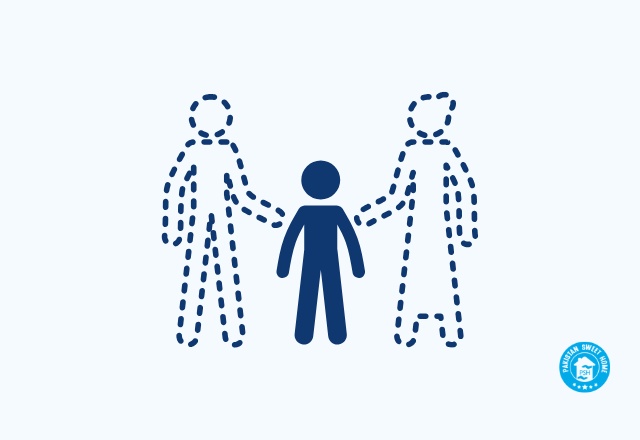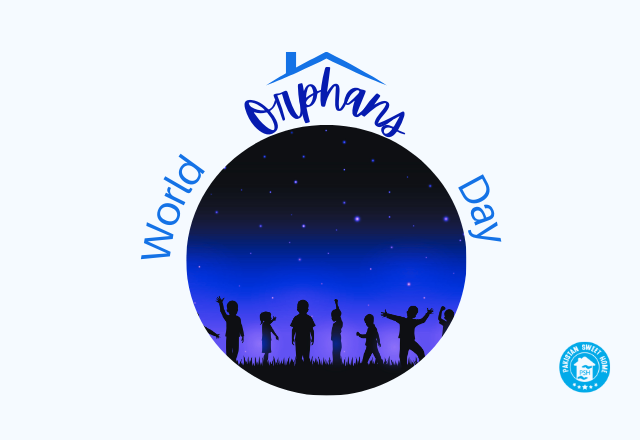Becoming an adult doesn’t mean you stop needing your parents.
But what if they’re no longer there?
The world expects you to “move on,” hold steady jobs, and make big decisions without a single hand to hold. There is no guidance, no backup, just silence where once there was unconditional support.
But with the right support and awareness, adult orphans can still build strong, meaningful lives.
Let’s explore what adult orphans are and what their challenges are in Pakistan:
What Is an Adult Orphan?
An adult orphan is someone over the age of 18 who has lost both parents. While society often focuses on orphaned children, adults who lose their parents face significant emotional and practical challenges. This includes grief, loneliness, and the absence of familial support.
Common Misconceptions
- "Adults don't need parental support." Many adults rely on their parents for emotional guidance, financial assistance, and familial connections.
- "They should be independent by now." Cultural norms in Pakistan often emphasize extended family support well into adulthood.
The Landscape of Orphanhood in Pakistan
Pakistan is home to over 4.2 million orphaned children, many of whom grow up to face adulthood alone.
Most orphanages stop support at 18, leaving them alone to face life’s biggest challenges. The absence of transitional support means many adult orphans remain vulnerable even after childhood ends.
Current Statistics
According to UNICEF, Pakistan is home to approximately 4.6 million orphaned children. Many become adult orphans without a robust support system as they age.
Transitioning to Adulthood
Upon reaching 18, many orphans age out of institutional care, facing the world without the necessary tools or support. This transition often leads to challenges in education, employment, and mental health.
Challenges Faced by Adult Orphans
The challenges adult orphans face go beyond grief. Many struggle with depression, low self-esteem, and a lack of purpose. Without parental guidance, they face educational and financial setbacks.
Adult orphans face stigma, are often seen as burdens, hurting their chances for jobs and marriage. The lack of legal or institutional support makes them even more susceptible to poverty and exploitation.
Emotional and Mental Health Struggles
The loss of parental figures can lead to prolonged grief, depression, and anxiety. Without access to counseling or mental health services, these issues can persist and worsen over time.
Educational and Vocational Barriers
Many adult orphans lack the financial support to pursue higher education or vocational training. This limits their job opportunities and affects their long-term economic stability.
Social Stigmatization
In some communities, adult orphans may face stigma and be seen as less stable. This perception of lacking family support can affect their social interactions and opportunities.
Lack of Institutional Support
Most support programs in Pakistan focus only on children. As a result, adult orphans often lack access to housing, healthcare, and financial help.
Existing Support Structures in Pakistan
While Pakistan has various orphan care initiatives in place, most of them are primarily designed to support children under the age of 18. These programs generally provide shelter, education, healthcare, and food security. However, the support tends to stop once the child legally becomes an adult.
Once orphans reach adulthood, they often find themselves without guidance or a support system. Financial aid is reduced or discontinued, and there is little to no structured planning for their future.
As a result, many adult orphans face significant challenges such as unemployment and limited access to higher education. They also struggle emotionally and often experience social isolation.
Government Initiatives
The Pakistan Bait-ul-Mal's Orphan Support Program provides financial assistance, particularly for female orphans. Enrolled families receive Rs. 8,000 monthly to support their children's basic needs. However, assistance often decreases once individuals reach adulthood.
Non-Governmental Organizations
Several NGOs in Pakistan are working actively to support orphaned children. However, most focus only on minors, leaving a significant gap in support after the age of 18.
- Pakistan Sweet Home (PSH):
In Pakistan, very few institutions offer complete care for orphaned children, but PSH stands out by doing just that. Even after they turn 18, PSH keeps helping them grow and succeed in adult life.
PSH helps these young adults continue their studies and learn job skills so they can become independent and successful. Their mission goes beyond survival—they nurture dreams and build futures.
Through its Aghosh Homes project, Alkhidmat supports over 30,000 orphans with education, healthcare, and shelter. However, most support ends when the child reaches adulthood.
- Pakistan Orphan Care Forum (POCF):
POCF partners with multiple child welfare organizations to deliver education, food, and healthcare to orphans across Pakistan. Like many others, their services are mainly targeted at children under 18.
While these organizations offer substantial support, their services primarily target children, leaving a gap for adult orphans.
Recommendations for Comprehensive Support
There’s an urgent need for policy reform. Support should extend beyond the age of 18 through tailored mental health services, mentorship programs, scholarships, and job placement.
Empowering adult orphans with education and emotional resilience can help break cycles of poverty and dependence. Community-driven initiatives and government-backed solutions can close the gap for these neglected young adults.
Policy Reforms
- Extend Support Age Limits: Revise policies to continue support beyond 18 years, recognizing the ongoing needs of adult orphans.
- Inclusive Programs: Develop programs specifically tailored for adult orphans, addressing their unique challenges.
Mental Health Services
- Accessible Counseling: Establish mental health services focused on grief and trauma counseling for adult orphans.
- Community Awareness: Promote awareness campaigns to destigmatize mental health issues and encourage seeking help.
Educational and Employment Opportunities
- Scholarships and Grants: Offer financial aid for higher education and vocational training.
- Job Placement Programs: Create initiatives that connect adult orphans with employment opportunities.
Community Engagement
- Mentorship Programs: Pair adult orphans with mentors who can provide guidance and support.
- Support Networks: Establish community groups where adult orphans can share experiences and resources.
Personal Stories of Adult Orphans
Sharing personal narratives can humanize the statistics and shed light on the real-life challenges faced by adult orphans. These stories can inspire empathy and motivate action within communities.
To truly understand the impact of being an adult orphan, we must listen to those living it.
1. Hafeez Ullah
Hafeez Ullah was enrolled in Sarhadi Yateem Khana (SYK) in 2004 after losing both parents at a young age. Through consistent care and educational support, he completed his schooling and started building a life independently. He worked in retail for some time, then got a stable job as a Sales Officer at Matto Sons in 2018, where he is still growing in his career.
2. Zafar Zehri
Zafar, orphaned and living on the streets of Khuzdar, Balochistan, was taken in by Roshni Homes Trust as a child. He studied software engineering and now works as a youth leader, encouraging others from similar backgrounds to overcome challenges. His life reflects what proper long-term care and education can do.
3. Syed Husnain Ali Shah
Husnain Ali, originally from Parachinar, has been part of Pakistan Sweet Home since 2011. After losing his parents, he found comfort, education, and a new purpose within the supportive environment of Sweet Home.
He completed his FSc from Cadet College Sohawa with 86%, showing his hard work and determination. Currently, Husnain is pursuing his LLB at The Institute of Legal Studies (TILS), setting his sights on a career in law and justice. His ultimate goal is to become the Prime Minister of Pakistan, driven by a strong desire to serve the nation and create better opportunities for orphans like himself.
How You Can Help
Here are the ways you can help the orphans
Donations: Contribute to organizations like Alkhidmat Foundation and Pakistan Orphan Care Forum, which provide essential services to orphans.
Volunteering: Volunteer your time and skills to mentorship, education, or community programs supporting adult orphans.
Advocacy: Raise awareness about adult orphans' challenges and push for policies that offer them essential support.
In conclusion, an adult orphan is someone who loses both parents or ages out of care without support. Adult orphans in Pakistan face a unique kind of loneliness—one that often goes unseen. They often face emotional, social, and financial struggles due to the lack of continued support after childhood.
While some government and non-government efforts exist, most services end at 18, leaving a critical gap. There is a growing need for policies that extend care into adulthood, including education, vocational training, housing, and mental health support.
To truly uplift adult orphans, comprehensive strategies must be adopted, both at the institutional and community levels. Individuals can also play a role by mentoring adult orphans, donating or volunteering to trusted organizations, or supporting inclusive initiatives.
Your Help Means the World to Them

info@pakistansweethome.org.pk
(051) 4865856
+92 335 1118477







